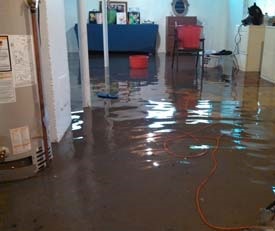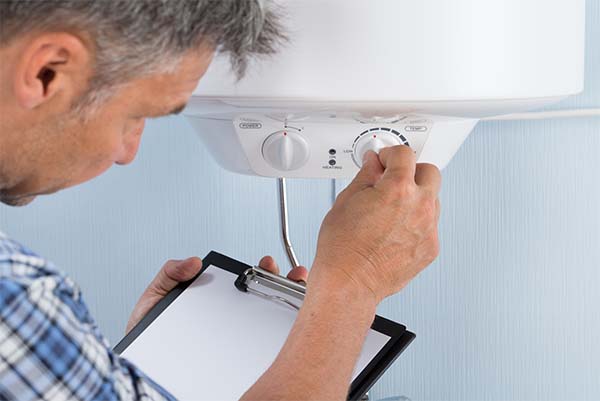Essential Advice for Residential Property Owners Dealing with Malfunctioning Heating Units
Essential Advice for Residential Property Owners Dealing with Malfunctioning Heating Units
Blog Article
We have stumbled on the article involving How to Avoid a Broken Hot Water Heater listed below on the net and reckoned it made good sense to discuss it with you on this site.

Whether it is located in the basement or a separate room, busted water heaters can cause stress. A typical system holds 80 gallons, so an overnight leakage will result in a flood. This leads to significant residential property damage with soaked wall surfaces and floorings. Having no hot water supply is additionally troublesome. If you are taking care of these issues, take note of the following:
Call the Plumber
After doing the first two security actions, you have to call your plumber to come right away to fix a fractured water heating unit. There are typically indicators that your aging water heating unit has sediment build-up in the interior.
Instead, as soon as you find these indications, have actually a specialist come to inspect your water heating unit storage tank. Commonly, water heating units have a life expectancy of concerning 8 to 12 years.
Cut Off the Cold Water Supply
Cut off the tanks faucet water supply from the resource. This goes from your major water line into the storage tank. When your storage tank is in good condition, the cold water quits filling out when the container is full. Since it is dripping, the water will certainly continue to stream. Close the shutoff located at the top of the heating system. Turn this clockwise to shut it off. If you can not find it or reach it, you should switch off that primary supply of water line outside your residential property.
Shut Off Source Of Power
Before calling the plumber, shut down a gas hot water heater by turning the temperature dial. This is normally situated at the top of the thermostat. Switch over off the circuit breaker if you have a design that runs on electrical power. This will protect against electrocution, specifically if there is a leak as water is a conductor. Typically, the heating element shuts off when the water hits a details temperature. However with a damaged storage tank, it might malfunction. Sufficing off assures you remain risk-free.
Clean Up Property
After calling the plumber, document damages by taking notes and also pictures so you can declare your property owner's insurance coverage. Eliminate any kind of standing water to stop mold and mold growth. If you have a completely submersible water pump, utilize that to drain the water.
Keep in mind, if you see any kind of problems with your hot water heater, call the pros as soon as possible. You can not take this issue lightly since a defective thermostat can raise water temperature to a precariously high degree, resulting in unintentional burns. A broken heating system stress safety valve can likewise cause a surge. For best results, obtain an annual check so your unit obtains checked, cleaned up, drained pipes, and also re-filled, assuring optimum efficiency.
After doing the first 2 safety actions, you should call your plumber to come right away to fix a burst water heater. Rather, as quickly as you detect these signs, have an expert come to evaluate your water heating unit tank. Prior to calling the plumber, closed off a gas water heating system by turning the temperature dial. If you have a completely submersible water pump, utilize that to drain the water. Keep in mind, if you discover any type of concerns with your water heating unit, call the pros right away.
Is My Water Heater Broken?
The Water Heater is Old
No appliance will last forever. This includes a home’s water heater. During its lifespan, residents are going to face a situation where a new water heater installation will be necessary. The biggest problem with this is that most people are not sure when their water heater expires. Not knowing this can lead to serious risks if the unit begins to act up due to old age.
Most makes and models of water heaters will last between eight and 10 years. While 10 years is the age when water heater replacement is highly recommended, the need to replace the unit may occur before this time or after. If the unit doesn’t show any symptoms of a problem, it is a good idea to replace it at the 10-year mark (from the manufacture date).
Some of the symptoms that indicate a new unit is needed include rusting, leaks, noises, and a failure to heat up the water. Also, note that not all units have a 10-year life expectancy. The main exception to this rule is that a gas unit will last for six to eight years.
Rusty Heater Inlet Valve or Water
While steel is the strongest material on earth, it does have a weakness – rust. If corrosion occurs on a steel surface, it will begin to spread and eat through the steel in certain areas. On water tanks and pipes that are made of steel, rust is a warning sign of an impending leak.
The issue for many is trying to figure out if the rust is coming from the water heater or the pipes that lead to the faucet. If rust is seen, it is a clear indication that water heater service from the professionals is needed.
If rusty water appears out of the faucets in the bathtub or sink, it likely means a rusty water heater. If there is rust near the water inlet or the pressure relief valve, rust has likely developed inside the tank. If tap water appears rusty, it may be an issue with the pipes.
Strange Sounds from the Water Heater
Are there strange sounds coming from the tank? As a water heater gets older, rumbling noises may develop and get louder and louder as the water in the tank heats up. In homes where large amounts of hot water are used, the issue is likely going to be even more obvious when more serious issues arise. If there is a strange or loud noise coming from the unit, it is probably because of sediment buildup. A good way to remedy this problem is by flushing the heater. If this does not work, then a new unit may need to be installed.
Leaks
As a water heater gets closer to the end of its useful life, there is a higher chance there will be water around the tank. If there is water, this usually means leaks are occurring. Based on where the unit is located in the home, a leak may result in serious property damage.
Leaks are usually caused by expansions in the metal tank. The expansions occur as time passes and as the inside body of the tank is exposed to multiple heating cycles per day. When a fracture forms, the gap will be slight enough to hold the water in; however, in more serious situations, this will not be the case. If the tank is idle, the water will not leak but when the metal expands during each heating system, small amounts of water will get through the gap.

Do you appreciate reading up on Maintaining & Draining a Water Heater? Put feedback down below. We would be pleased to see your responses about this piece. In hopes to see you back again before long. Are you aware of somebody else who is excited by the topic? Feel free to share it. We thank you for reading our article about Broken Water Heaters.
For quick relief, contact! Report this page